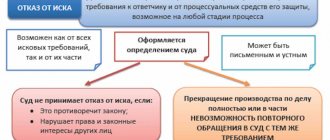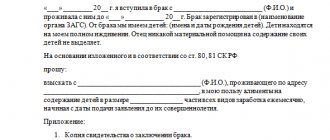A sample application (petition) to cancel the security of a claim, taking into account the latest changes in legislation. The court takes measures to secure a claim only upon a corresponding application from an interested person. Moreover, when such an application is submitted by a representative, such a right must be specifically stipulated in the power of attorney. On its own initiative, the court will not take measures to secure the claim. In this case, the court considers the application for securing the claim without summoning the parties. In order to maintain a balance of interests of the parties, the legislator grants the right to a person whose rights and legitimate interests are violated by securing a claim to file an application to cancel the securing of a claim. As a general rule, such a party is the defendant.
When the defendant has received a court ruling to secure the claim, he can file a private complaint against it. Or he can file an application to cancel the security for the claim. And both methods can be used simultaneously. The purpose of securing a claim is the possibility of enforcement of a court decision in the future. It is necessary so that the defendant cannot hide property or funds. Moreover, measures to secure the claim will remain in place until the court decision is executed. Another way to minimize possible negative consequences for the plaintiff is to file an application for replacement of measures to secure the claim.
How to substantiate an application
The reasons for canceling the security of a claim may be:
- Initially there were no grounds for taking such a measure. The defendant did not attempt to hide the property or otherwise “deduce” from a possible foreclosure on the property during the execution of the court decision. It is difficult to prove this fact, because the court has already made a decision and agreed with the plaintiff on the need for such measures. But in judicial practice there is cancellation on this basis.
- the court left the claim without consideration, the case was dismissed, the claim was denied, etc. In this case, for various reasons, the determination to take such measures may not be canceled. Although there are no longer any formal grounds for them to act. Therefore, in this case it is enough to indicate the fact of making a procedural decision
- the measures taken are disproportionate to the claims. For example, the plaintiff reduced his demands. In this case, the court will not cancel the measures completely, but may reduce the amount of security.
- impossibility of normal business activities. This method is used by organizations and individual entrepreneurs. In this case, you will have to provide strong evidence of the impossibility of paying taxes, settlements with counterparties, and possibly signs of bankruptcy. That is, in this case, the balance of the parties is so significantly disrupted that the defendant faces large losses.
- other grounds when the taken security measures do not serve the purpose of their application.
How to convince the arbitration court to take interim measures?
The court must be convinced that:
- If the arbitration court does not take interim measures, the company will suffer significant damage.
- If the arbitration court takes interim measures, then the interests of the budget will not suffer. This conclusion follows from paragraph 3 of the Information Letter of the Presidium of the Supreme Arbitration Court of the Russian Federation dated August 13, 2004 No. 83:
It must be borne in mind that the suspension of acts, decisions of state and other regulatory bodies is unacceptable if there is reason to believe that the suspension of the act or decision may upset the balance of the interests of the applicant and the interests of third parties, public interests, and may also entail the loss of an opportunity execution of the contested act, decision in case of refusal to satisfy the applicant’s claim on the merits of the dispute.
Submission and consideration of an application
The interested party submits an application to cancel the security for the claim to the court that is considering the case. If the court has already made a decision and there has been an appeal, then to the court of first instance (after all, the measures to secure the claim are preserved until the decision is executed). The one who considered the case on its merits.
The court considers the application to cancel the security for the claim at a court hearing. This means that the court will notify the parties to the case. And he will make a decision taking into account the opinions of other participants in the case. Therefore, in this case, a copy of the application must be sent to other participants in the case before filing documents with the court. Attach proof of dispatch (delivery) to the application.
On the issue of canceling the security for the claim, the court will issue a ruling, which can be appealed to a higher court. After the court ruling enters into legal force, the measures to secure the claim are cancelled.
In ___________________________ (name of court) Plaintiff: ____________________ (full name, address,
contact phone number, email address mail)
Respondent: ___________
(full name, address,
date and place of birth, place of work, one of the identifiers,
for the organization - corporate name,
address, INN and OGRN, representative details)
within the framework of case No. __________
Filing an application to secure a claim if the composition and location of the debtor’s property is unknown
In a number of cases, when filing a statement of claim, plaintiffs need to apply to the court to secure the claim, i.e. on the adoption by the court of interim measures in the form of seizure of the debtor’s property. However, plaintiffs do not always know the composition of the debtor’s property and its location.
Courts, when considering an application to secure a claim, sometimes refuse to take interim measures on the grounds that the plaintiffs have not provided evidence of the ownership of the property by the defendants and the impossibility of providing the specified information, and also due to the fact that the plaintiffs have not provided evidence that may complicate or make it impossible to enforce a court decision.
Consequently, when filing an application to secure a claim, plaintiffs need to sufficiently motivate it and provide convincing arguments that failure to take measures to secure the claim may make it difficult or impossible to enforce the court decision. It is not without foundation that the defendant, having received the statement of claim, will take actions aimed at alienating his property in order to preserve it.
As one of the options for motivating an application for securing a claim in the case when the plaintiffs are collecting a debt from the defendant, say, for example, 500 thousand rubles, which is not returned for a long time
In accordance with Art. 139 of the Code of Civil Procedure of the Russian Federation, upon the application of persons participating in the case, a judge or court may take measures to secure the claim. Securing a claim is allowed in any situation in the case if failure to take measures to secure the claim may complicate or make it impossible to enforce the court decision.
According to Part 1 of Art. 140 of the Code of Civil Procedure of the Russian Federation, measures to secure a claim, among other things, are:
- seizure of property belonging to the defendant and located with him or other persons (Clause 1, Part 1, Article 140 of the Code of Civil Procedure of the Russian Federation);
- prohibiting other persons from performing certain actions related to the subject of the dispute, including transferring property to the defendant or fulfilling other obligations in relation to him (Clause 3, Part 1, Article 140 of the Code of Civil Procedure of the Russian Federation).
By virtue of Part 3 of Article 140 of the Code of Civil Procedure of the Russian Federation, measures to secure the claim must be proportionate to the claim stated by the plaintiff.
The defendant's debt to the plaintiff amounts to 500,000 rubles; therefore, claims of a property nature have been filed.
In accordance with paragraph 29 of the Resolution of the Plenum of the Supreme Court of the Russian Federation dated June 24, 2008 No. 11 “On the preparation of civil cases for trial,” since Article 139 of the Code of Civil Procedure of the Russian Federation allows for securing a claim in any state of the case, the judge must keep in mind that securing a claim is possible and in the course of preparing the case for trial (clause 12 of part 1 of article 150 of the Code of Civil Procedure of the Russian Federation). In the conditions of judicial proceedings based on adversarial and equal rights of the parties, the judge does not have the right, on his own initiative, to take measures to ensure the requirements stated by the parties. Taking into account the requirements of Part 3 of Article 140 of the Code of Civil Procedure of the Russian Federation, a judge, allowing measures to secure a claim at the stage of preparing the case for trial, is not bound by the initiative of the applicant and must ensure that the measures to secure the claim are proportionate to the stated requirements. An application for securing a claim is considered on the day it is received by the court without notifying the defendant or other persons participating in the case. The judge issues a ruling on taking measures to secure the claim (Article 141 of the Code of Civil Procedure of the Russian Federation).
Thus, the judge does not have the right, on his own initiative, to take measures to secure the claims stated by the parties, but taking into account the requirements of Part 3 of Article 140 of the Code of Civil Procedure of the Russian Federation, the judge is not bound by the initiative of the applicant and must ensure that the measures to secure the claim are proportionate to the stated requirements.
The judge is not bound by the applicant’s initiative, including regarding the composition of the property that may be seized, and must ensure that measures to secure the claim are proportionate to the stated requirements.
The plaintiff does not know either the composition of the property or the location of the defendant's property.
However, the absence in the application for securing a claim of information about the list of the debtor’s property, or evidence of the ownership of specific property by the debtor, does not prevent the application of measures to secure the claim. The bailiff is vested with the authority to establish the property of the debtor.
So, clause 3, part 3, art. 80 Federal Law of October 2, 2007 No. 229-FZ “On Enforcement Proceedings” provides for the seizure of the debtor’s property during the execution of a judicial act on the seizure of property belonging to the debtor and located with him or third parties.
In accordance with paragraphs 5, 8 of Art. 69 of the said law, if there is no information about the debtor’s property, then the bailiff requests this information from the tax authorities, other bodies and organizations, based on the amount of debt (from the authorities carrying out state registration of rights to property, persons keeping records rights to securities, banks and other credit organizations, owners of nominal bank accounts). The debtor has the right to indicate the property on which he asks to foreclose first. The final order of foreclosure on the debtor’s property is determined by the bailiff.
Thus, failure to provide evidence of ownership of the property by the defendant is not a circumstance preventing the application of interim measures.
In addition, the defendant has not fulfilled his obligations to repay the debt for a long time, which indicates that he does not intend to fulfill his obligations in the future.
The above arguments indicate the existence of a threat of non-execution of a court decision if the claim is satisfied, which is the basis for the use of interim measures.
When considering a claim, it is necessary to ensure that the measures to secure the claim are proportionate to the stated requirements. That is, it is necessary to choose the optimal measure, or a combination of proposed measures in such a volume that corresponds to the stated claim and contributes to the actual execution of the decision if the claim is satisfied.
Interim measures are taken by the court within the limits of the stated requirements, i.e. within 500,000 rubles.
The pleading part of the claim must include the following wording:
In order to secure the claim, I ask you to seize the property of the defendant Ivanov I.I., DD.MM.YYYY year of birth, residing at the address: ______________, within the limits of the claim in the amount of 500,000 rubles
Drawing up an application
All appeals to the court are built on a single principle, that is, they consist of a standard set of structural elements - “heading”, name, as well as descriptive, motivational and operative parts.
As part of this article, you can download a standard template for an application (petition) to cancel restrictive measures. You only need to fill out the lines provided, including the following information:
- name of the court or territorial body of the FSSP;
- Full name (names) of address, procedural status of the plaintiff and defendant or claimant and debtor;
- information about the case under consideration or existing enforcement proceedings;
- the grounds on which the applicant requests the cancellation of interim measures;
- a list of attachments, if the grounds for the application are supported by documents;
- date and signature of the applicant.
Plaintiff's application for cancellation
In some cases, the plaintiff may also request the cancellation of interim measures. For example, the parties may agree, and the defendant transfers to the plaintiff his property, which was seized. In this situation, the seizure of the property will prevent the plaintiff from transferring what he received to himself.
The plaintiff's request to cancel the interim measures requested by him in most cases is granted by the court. No special arguments or lengthy substantiation of the position are required.
Grounds for cancellation
The key to the application for cancellation of interim measures will be the justification of why the previously made decision to impose restrictions on the defendant needs to be canceled. There is no single advice for all occasions here. The defendant must independently determine the strongest arguments in favor of canceling the security.
For example, cancellation of security will be justified if the value of the claim has decreased significantly. This may happen if the plaintiff abandoned part of the claims, or the defendant partially fulfilled them.
Expert opinion
Lawyer Alexander Vasiliev comments
Cancellation of security will also be justified if the measures taken create unjustified inconvenience for the defendant or prevent him from fulfilling the legal demands of other persons. For example, on this basis, an individual entrepreneur can challenge the seizure of bank accounts from which he pays salaries to his employees.
The basis for cancellation may also be partial fulfillment of the claim, the conclusion of a settlement agreement by the parties and other grounds.
It is important in the application to clearly indicate what exactly should be canceled and why.
From judicial practice: the defendant asked the court to cancel the interim measures for the part of the building belonging to him, indicating that it was not the subject of the dispute. The court found that it does not follow from the application in respect of which property the security should be revoked, whether this property is the property of the applicant or a third party. On this basis the application was refused.
Types of interim measures
Material claims are very diverse. They may relate to issues of collection of funds, return of property (vindication claims), recognition of ownership, etc.
Interim measures may be applicable to any of the material claims, and it is the claims that determine the type and composition of the interim measures.
A complete list of possible interim measures is given in Article 91 of the Arbitration Procedure Code of the Russian Federation.
Thus, an interim measure in a claim for recognition of ownership of a residential building may be a ban on the alienation of this house. Seizure of accounts, as an interim measure, can be applied in claims for debt collection, etc.
Interim measures can be combined. For example, under claims for the collection of a large debt, the debtor's bank accounts and his car may be seized.
Enforcement of foreclosure
Interim measures are a way to ensure the fulfillment of certain monetary obligations that have already been established by a court decision or that are yet to be established during the trial.
That is, an interim measure in itself is not equivalent to execution. Its meaning is the transformation of one or another property of the debtor into a kind of collateral, which, in the process of executing the decision, can become a source or the main means of repaying the debt.
Interim measures are established by the court or bailiff on the basis of the claimant's application to secure the claim, a civil claim in a criminal case or a writ of execution.
Plaintiff's objections
The plaintiff has the right to object to the cancellation of measures to secure the claim. As a rule, objections come down to a repetition of the arguments with the help of which interim measures were obtained. The plaintiff has the right to formulate his objections in writing in the form of a response to the application for the cancellation of interim measures. In addition, he can express his position directly during the court hearing.
Expert opinion
Lawyer Alexander Vasiliev comments
The defendant’s task is to prove to the court that there is in fact no risk of non-enforcement of the court decision. In such situations, the subjective discretion of the judge hearing the case plays a big role - how credible the defendant is. If the court remains concerned that if the interim measures are canceled it will get rid of property or money in the accounts, the security will not be cancelled.
What should be included in the complaint
First of all, these are the details of the court where it is being filed, as well as all the necessary information about the parties involved in the civil case. After this, you need to describe the essence of the complaint. It may be different, depending on who is appealing the determination.
We recommend! Private complaint against the ruling to the board of appeal
For example, if the defendant insists against the imposition of measures, then you need to write down what rights are affected by the adopted determination. It would also be useful to refer to procedural violations committed when making the determination.
In addition, improperly securing a claim in civil proceedings may be fraught with losses for the party. This can also be mentioned in a private complaint.
If the plaintiff challenges the determination, he must justify why the court, contrary to the law, did not take measures to impose encumbrances on the property or did so to an insufficient extent to resolve the dispute.
The legislation provides only 15 days for appealing court decisions to secure a claim. The specified period, as a rule, is calculated from the date of the ruling. However, if the party was not present at the hearing, then the period for preparing the complaint is calculated from the moment it became known about the court’s actions and taking interim measures.
If the securing of the claim became known after some time, then evidence of this should be provided in the complaint. It would also be useful to attach documentary evidence (a copy of the envelope from the court, a decree from the bailiff).
Expert commentary
Roslyakov Oleg Vladimirovich
Lawyer, specialization civil law. More than 19 years of experience.
Ask a question
In any case, it is advisable to prepare a private complaint in cooperation with a lawyer. At the same time, he will take into account not only those provisions that are prescribed in the Code of Civil Procedure of the Russian Federation, but also the established judicial practice in terms of securing claims in similar cases. In order to make the task easier, we provide a sample of a private complaint, which can be modified in relation to your own case and supplemented with new grounds.








